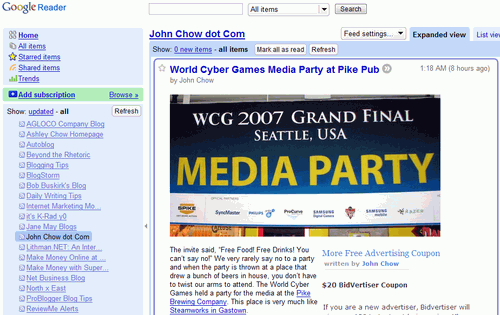One of the great built in features to your blog is the ability for your content to be delivered in RSS format. A lot of new bloggers are not aware of what RSS does and the benefits to promoting it. Also a very small percentage of your site visitors (depending on your site niche) will know how to make use of RSS. With John Chow and Shoemoney facing off in an RSS challenge I predict we will see this month a focus in the blogsphere on RSS education in general.
So what is RSS?
RSS is an acronym that stands for Really Simple Syndication. RSS makes use of XML which is a markup language that was designed to bridge information between various web applications. XML allows content to be delivered properly from web browsers to cell phones. RSS is normally viewed through an RSS reader and unlike surfing with a web browser for new content on a site, RSS pushes out new content to you. If you have a blog you really have nothing to do to enable RSS as it is already a full feature built in. Follow along with this RSS Tutorial for those sites that are not blogs.
What is an RSS reader?
RSS readers are plug-ins, sites or software used to specifically view RSS feeds. There are lots of options in the way of RSS readers. A few of the readers and options are…
Browser Built in RSS
Both IE 7 and FireFox 2 understand the importance of RSS and how it is changing the future of the web. Both have an RSS reader built right into them and make it easier for new users to start learning about RSS. One thing I have found with these features is it can bog down your system and it’s not easy to organize your RSS feeds.
Outlook Plug-ins
Outlook 2007 has an RSS reader built into the software. Outlook 2007 allows you to subscribe to feeds and every time your Outlook looks for an email it checks for new RSS content. If you have an earlier version of Outlook then NewsGator has a plug-in that can purchase.
RSS Reader Software
Like email software there are 100’s of RSS Reader software out there. There are free readers and paid readers and all of them have their own advantages and disadvantages. I tested FeedDemon, FeedReader and Snarfer. All of them had almost identical functionality and in this area there does not seem to be an industry leader. One thing I found frustrating about this solution was that I had to keep the software open to be notified of new content.
Online RSS Reader

Google Reader is by far the best solution for online RSS readers. You can easily add new feeds, search past content, organize your feeds among many other features. There is also a free notifier that pops up when you have new content to read. Of all the readers this is the one solution I do highly recommend.
RSS by Email
John recently added an option to subscribe to his RSS by email. This is a really cool way to subscribe. Enter your email address into the subscription box below, then confirm the confirmation email. Once you’ve done that, all future posts will be delivered right into your email inbox.
Now that you have a bit of an idea what RSS is and how you can use it I’m sure you are wondering why you should use RSS? The number one reason to use RSS is that instead of spending countless hours surfing from site to site looking for new content you can now sit back and wait for new content to be pushed to you.
If you are not using RSS already then you should start using it today. RSS is the future so getting involved now will help you in the long run.
This post was guest blogged by Gary Jones from BlueFur.com. BlueFur provides Managed Blog Hosting making blogging easier for you with pre-installed WordPress, upgrades and plug-ins installs.
